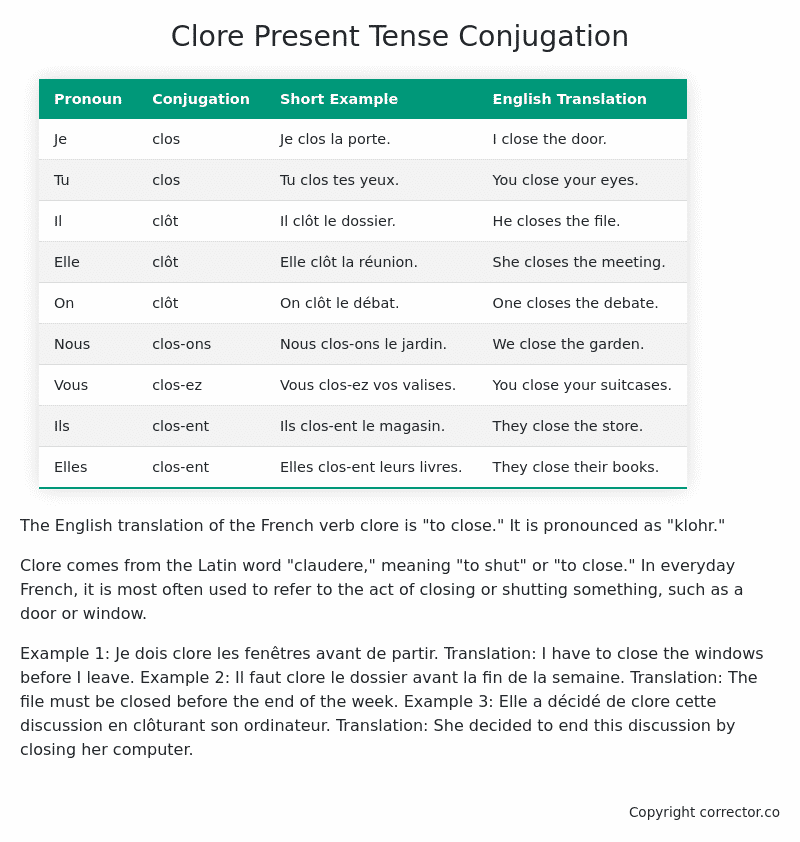Le Present (Present Tense) Conjugation of the French Verb clore
Introduction to the verb clore
The English translation of the French verb clore is “to close.” It is pronounced as “klohr.”
Clore comes from the Latin word “claudere,” meaning “to shut” or “to close.” In everyday French, it is most often used to refer to the act of closing or shutting something, such as a door or window.
Example 1: Je dois clore les fenêtres avant de partir. Translation: I have to close the windows before I leave.
Example 2: Il faut clore le dossier avant la fin de la semaine. Translation: The file must be closed before the end of the week.
Example 3: Elle a décidé de clore cette discussion en clôturant son ordinateur. Translation: She decided to end this discussion by closing her computer.
Clore – About the French Present Tense
To take a deep dive into all the French tenses then see our article on Mastering French Tense Conjugation.
Common Everyday Usage Patterns For Le Present
Interactions with Other Tenses
Table of the Present Tense Conjugation of clore
| Pronoun | Conjugation | Short Example | English Translation |
|---|---|---|---|
| Je | clos | Je clos la porte. | I close the door. |
| Tu | clos | Tu clos tes yeux. | You close your eyes. |
| Il | clôt | Il clôt le dossier. | He closes the file. |
| Elle | clôt | Elle clôt la réunion. | She closes the meeting. |
| On | clôt | On clôt le débat. | One closes the debate. |
| Nous | clos-ons | Nous clos-ons le jardin. | We close the garden. |
| Vous | clos-ez | Vous clos-ez vos valises. | You close your suitcases. |
| Ils | clos-ent | Ils clos-ent le magasin. | They close the store. |
| Elles | clos-ent | Elles clos-ent leurs livres. | They close their books. |
Other Conjugations for Clore.
Le Present (Present Tense) Conjugation of the French Verb clore (this article)
Imparfait (Imperfect) Tense Conjugation of the French Verb clore
Passé Simple (Simple Past) Tense Conjugation of the French Verb clore
Passé Composé (Present Perfect) Tense Conjugation of the French Verb clore
Futur Simple (Simple Future) Tense Conjugation of the French Verb clore
Futur Proche (Near Future) Tense Conjugation of the French Verb clore
Plus-que-parfait (Pluperfect) Tense Conjugation of the French Verb clore
Passé Antérieur (Past Anterior) Tense Conjugation of the French Verb clore
Futur Antérieur (Future Anterior) Tense Conjugation of the French Verb clore
Subjonctif Présent (Subjunctive Present) Tense Conjugation of the French Verb clore
Subjonctif Passé (Subjunctive Past) Tense Conjugation of the French Verb clore
Subjonctif Imparfait (Subjunctive Imperfect) Tense Conjugation of the French Verb clore
Subjonctif Plus-que-parfait (Subjunctive Pluperfect) Tense Conjugation of the French Verb clore
Conditionnel Présent (Conditional Present) Tense Conjugation of the French Verb clore
Conditionnel Passé (Conditional Past) Tense Conjugation of the French Verb clore
L’impératif Présent (Imperative Present) Tense Conjugation of the French Verb clore
L’infinitif Présent (Infinitive Present) Tense Conjugation of the French Verb clore
Struggling with French verbs or the language in general? Why not use our free French Grammar Checker – no registration required!
Get a FREE Download Study Sheet of this Conjugation 🔥
Simply right click the image below, click “save image” and get your free reference for the clore Present Tense tense conjugation!

I hope you enjoyed this article on the verb clore. Still in a learning mood? Check out another TOTALLY random French verb present conjugation!


